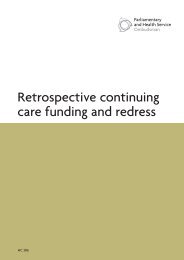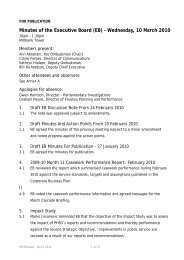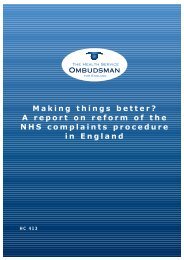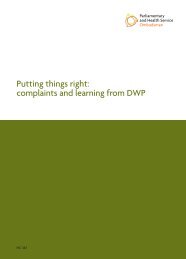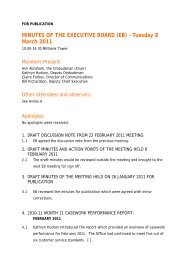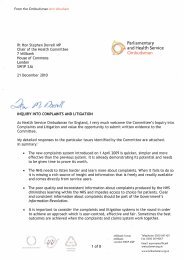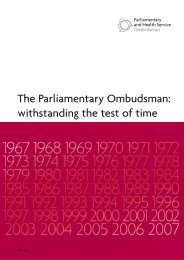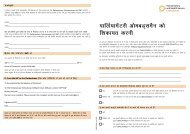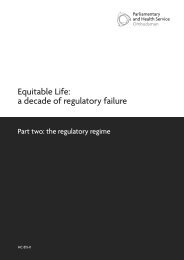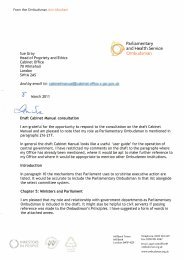Annual Report 2007-08 - the Parliamentary and Health Service ...
Annual Report 2007-08 - the Parliamentary and Health Service ...
Annual Report 2007-08 - the Parliamentary and Health Service ...
- No tags were found...
You also want an ePaper? Increase the reach of your titles
YUMPU automatically turns print PDFs into web optimized ePapers that Google loves.
17Case StudyTrust failed to update amputeeson service improvementsMany of <strong>the</strong> cases we investigated in<strong>2007</strong>-<strong>08</strong> illustrated serious failings atlocal level. In <strong>the</strong> case of Mrs Y acomplaint about <strong>the</strong> pros<strong>the</strong>tic serviceprovided to amputees by her PrimaryCare Trust was upheld by an IndependentReview Panel. The Trust agreed to makeseveral changes to its procedures, but<strong>the</strong>n failed to keep Mrs Y informed about<strong>the</strong>ir implementation.The need for local leadershipImproved local resolution of NHScomplaints will not come about withoutstrong leadership at a senior level in Trusts<strong>and</strong> General Practices. Board members,chief executives <strong>and</strong> senior practitionersneed to create a culture that welcomescomplaints <strong>and</strong> actively seeks to resolve<strong>the</strong>m, dealing with people fairly <strong>and</strong> beingwilling to learn from mistakes <strong>and</strong> servicefailures. Many of <strong>the</strong> cases of poorcomplaint h<strong>and</strong>ling that we investigateshow why this strong, focused localleadership is so necessary to driveimprovements. In each of <strong>the</strong>se cases,strong local leadership, a culture ofopenness towards complaints <strong>and</strong> adetermination to put things right couldhave prevented distress to those involved.In <strong>the</strong> case of Mrs G we recommendedcompensation by <strong>the</strong> Trust <strong>and</strong> <strong>the</strong><strong>Health</strong>care Commission following <strong>the</strong>poor h<strong>and</strong>ling of a complaint about <strong>the</strong>care <strong>and</strong> treatment of her daughter, whodied after surgery. We found that <strong>the</strong>Trust’s response to <strong>the</strong> Commission’srecommendations was inadequate, <strong>and</strong>that its actions had caused Mrs G tosuffer fur<strong>the</strong>r distress.Mrs Y, an amputee, was concerned about <strong>the</strong> pros<strong>the</strong>tic serviceprovided on <strong>the</strong> Isle of Wight, to <strong>the</strong> extent that she felt her carehad been seriously compromised. Her concerns included a lack ofpros<strong>the</strong>tic expertise, <strong>the</strong> lack of a consultant-led multidisciplinaryteam, <strong>and</strong> <strong>the</strong> availability of information, protocols or guidelinesaround treatment options. She made a complaint to <strong>the</strong> Isle ofWight Primary Care Trust (<strong>the</strong> Trust), which ended with anIndependent Review Panel in January 2005. The Panel found thatMrs Y’s complaint was justified <strong>and</strong> made several recommendationswhich <strong>the</strong> Trust agreed to implement. The Trust told Mrs Y thatit was committed to implementing <strong>the</strong> recommendations. It alsocarried out a Pros<strong>the</strong>tic <strong>Service</strong>s Review.Mrs Y complained to <strong>the</strong> Ombudsman that although shehad contacted <strong>the</strong> Trust on a number of occasions, it had notadequately communicated with her about how it wouldimplement <strong>the</strong> Panel’s recommendations, <strong>and</strong> had given her noofficial reassurances that appropriate changes to <strong>the</strong> servicewould be made. She hoped that her complaint would lead toimprovements for amputees with complex needs living on <strong>the</strong>Isle of Wight.We fully upheld Mrs Y’s complaint. The Trust accepted it hadnot kept Mrs Y formally informed <strong>and</strong> updated about <strong>the</strong>implementation of <strong>the</strong> Panel’s recommendations. Fur<strong>the</strong>rmore,Mrs Y’s complaint to <strong>the</strong> Trust had been made personally, <strong>and</strong><strong>the</strong> Trust had wrongly assumed that she had been kept updatedabout progress by <strong>the</strong> Artificial Limb User Group.The Trust gave us a copy of <strong>the</strong> Pros<strong>the</strong>tic <strong>Service</strong>s Review report<strong>and</strong> <strong>the</strong> Pros<strong>the</strong>tics Action Plan, which our advisers consideredcontained useful recommendations. The Trust also acknowledged<strong>the</strong> need to commission specialist mainl<strong>and</strong> services for complexcases, such as that of Mrs Y, <strong>and</strong> told us that a meeting had beenheld with <strong>the</strong> staff of a specialist centre in Bournemouth.Arrangements for Mrs Y to be seen <strong>the</strong>re were also progressing.The Trust agreed to apologise to Mrs Y for <strong>the</strong> failings we hadidentified, <strong>and</strong> to arrange a meeting with her to address anyremaining concerns that she had.We also investigated <strong>the</strong> case of Dr R,a GP who retired on health groundsafter a poorly h<strong>and</strong>led investigation bytwo Trusts of a complaint against her.We recommended substantial financialcompensation by way of remedy, <strong>and</strong>she received a total of £25,000.40



